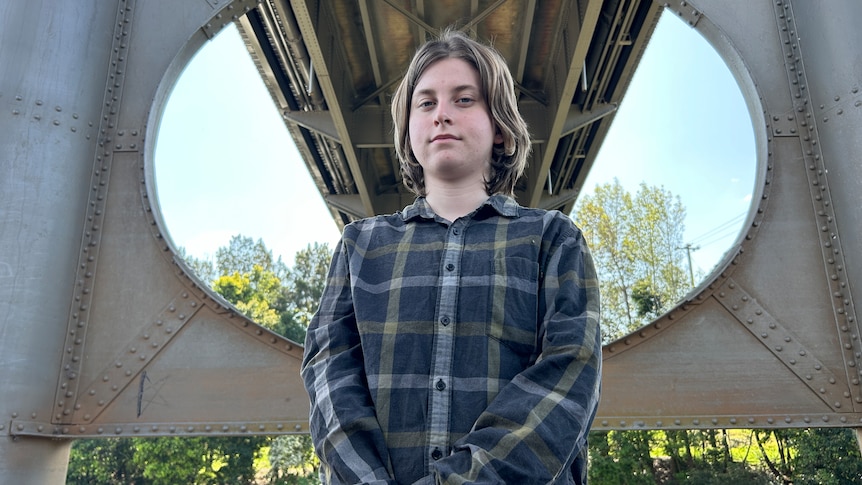Foreboding, looming and overwhelming — that’s how Remy describes their feelings about the future. They are only 18 and still in high school but feel life has been overshadowed by financial worry. Remy is one of thousands of young Australians whose concerns about financial stress have been captured in a report by youth mental health organisation Orygen. Lead author Kate Filia said the report painted a bleak picture for those aged 15 to 19 “without the hope, motivation and idea that they are going to have success”. “The more impacted they are now, the more they feel like they don’t have control over their lives,” Dr Filia said. “Where we talk about the impact of the cost-of-living crisis on mental health and wellbeing, that comes back and impacts a person’s ability to take part in activities, to do things that will help them succeed in the future. Skipping meals, missing out Of the almost 20,000 young people surveyed by Mission Australia for Orygen, one in five were experiencing financial hardship, with serious impacts on mental health and wellbeing. “It’s not like going without Disney Plus … [they were] reporting things like going without meals, or not being able to pay bills or car expenses or school expenses,” Dr Filia said. “That contributes to further exclusion with their peers.” Remy, who lives in the regional town of Lismore, feels lucky in some ways. They don’t need to skip meals but they do avoid activities that cost money. Remy will graduate from school soon and works casually to pay for doctor’s appointments and medication. “Most of my friends are making money themselves and not getting a lot of help from their families,” they said. “At my dad’s we live off his income as his wife’s unable to work. That’s six mouths to feed. It does get tight.” Fears for the future Of those surveyed, more than half were worried about their financial future. The report also revealed that in two years, the number of young people who felt “financial matters” was one of the most important issues in Australia had tripled. “That’s a huge increase [in concern] for kids,” Dr Filia said. Remy’s financial future is their “number one biggest worry”, especially living regionally. “It just feels like a very foreboding, looming, overwhelming feeling. It’s hard to think about it,” they said. “We’re meant to be excited about moving out to the city, but I have this fear of what it’s going to cost to move and then just to exist there. And if I’ll be able to get a job and if that job will pay enough.” Dr Filia said she was surprised. “That’s just not something that I think typically adolescents tend to worry about historically,” she said. She believed cost of living, climate concerns, social isolation and loneliness were drivers for the youth mental health crisis and exposure to those social issues was compounding the impact. Loading “It’s just in their faces, on their phones, on their screens,” she said. “It’s so prevalent and so present for them that it’s hard for them to escape. Sacrificing their dreams Sam Puleiku is a team leader for the RESET4Youth program in south-west Sydney run by Mission Australia. It is an early intervention program to tackle youth homelessness and many people he works with are from marginalised and culturally diverse backgrounds. Mr Puleiku said financial pressures had a big impact on young people’s choices for the future. “[One teenager] had grand ideas of being a paediatrician. I told her that’s amazing, but even for that 17-year-old, she’s mature enough to consider how a lack of finance has an impact on her future career prospects,” he said. “She’s one of eight kids in her home, but she might have to abandon those plans to now step away from those dreams to meet the immediate needs at home. There’s the guilt of having seven other siblings to support. Psychologist and mental health academic Alyssa Milton said young people are increasingly aware of those pressures at a time when their brains operate differently. “[It’s the] planning and thinking: What next? How can I support myself? It’s brain development, but it’s also general knowledge in life. Who do I reach out to?” Dr Milton explained. “Knowing these things and how society works is something you’re still learning, let alone if you’re coping with mental health issues. And knowing where to go and who to speak to and how to solve problems. What can we do better? The report called for increased financial support, more housing options and opportunities for young people to engage with each others in their communities. Much of this has been recommended in the past. But the report also recommended the introduction of a ‘social transition passport’, an app which could be developed by the federal government and Services Australia to help young people navigate their finances. “Having an app that can guide them through what they need to do for different services and different supports is one great opportunity to deliver that information,” Dr Filia said. Remy was always determined to go to uni, but now feels it might not be achievable. “I would love to keep learning, but the price of it all, plus the big old debt on the end, feels really limiting. “I want to experience life as a young adult.” Loading…
Subscribe
Login
0 Comments





